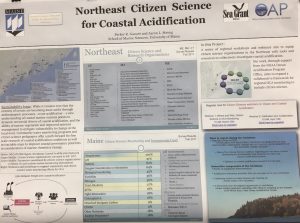Northeast Citizen Science for Coastal Acidification
A Mitchell Center project expands community resilience through citizen science, outreach, and education
Master’s student Parker Gassett presented a poster at the 2018 Maine Sustainability and Water Conference titled “Northeast Citizen Science for Coastal Acidification.” The poster detailed work being done by the Mitchell Center-funded project Ocean and Coastal Acidification in Maine.
The project is led by Aaron Strong, assistant professor, School of Marine Sciences and Mitchell Center faculty fellow, and by Esperanza Stancioff, University of Maine Cooperative Extension and Maine Sea Grant Extension professor. Gassett, a dual Marine Policy/Marine Biology major, is a team member on the project and is leading the behind-the-scenes work for a series of workshops and webinars to advance best practices in citizen science efforts to monitor ocean and coastal acidification.

As noted in Gassett’s poster, a series of regional workshops and webinars aim to equip citizen science organizations in the Northeast with tools and resources to collectively investigate coastal acidification. New understanding of coastal marine systems points to the importance of monitoring terrestrial drivers of coastal acidificationand the ability of watershed management and nutrient management to improve resilience to change at the local level.
Says Gassett, “Community water monitoring programs and citizen science methodologies offer a path forward for fine-scale research of coastal acidification conditions as well as tractable steps to improve coastal governance priorities in consideration of marine chemistry change. Our work, through support from the NOAA Ocean Acidification Program Office, aims to expand a collaborative framework for regional marine monitoring to include citizen science.”
The project’s inaugural workshop was held last June at UMaine’s Darling Marine Center.Affiliates of the Maine Ocean and Coastal Acidification Partnershipmet together with representatives from the U.S. Environmental Protection Agency, the National Oceanic and Atmospheric Administration and industry stakeholders.
Gassett notes that the next round of three workshops are specifically oriented for citizen science trainings and will be held in Connecticut, Massachusetts and Maine in the spring of 2018.
 From a big-picture perspective, Gassett says that “concern about ocean acidification, and what it might mean for Maine’s marine resource-oriented economy and cultural identity, has led to a number of different organizations coming together for the very first time to work on resilience to acidification. What has emerged is collective support for partnerships and collaboration.”
From a big-picture perspective, Gassett says that “concern about ocean acidification, and what it might mean for Maine’s marine resource-oriented economy and cultural identity, has led to a number of different organizations coming together for the very first time to work on resilience to acidification. What has emerged is collective support for partnerships and collaboration.”
He adds, “As a student of environmental science, it has been fascinating for me to see how social networks are involved in responding to this challenge. My initial work on this project involved identifying water monitoring stakeholders and interviewing them about their role ocean acidification efforts. Asking for example, how is it that you came to be involved in the newly established Maine Ocean and Coastal Acidification Partnership?”
What emerged in part from Gassett’s profile interviews was a road map for new opportunities to link community engagement with existing acidification monitoring and resilience efforts.
Gassett noted that local water monitoring programs are responsive to the contemporary challenges that face Maine’s coasts, and these community leaders have a role to play in research and stewardship for the coastal environments vulnerable to ocean acidification.
Gassett says, “I’m working on one wing of a broad effort to help citizen science monitoring groups get the right support to participate with state and regional monitoring networks. EPA monitoring guidelines and NOAA Ocean Acidification Program resources are the tools that we are now providing through outreach and hands-on training.”
Adds Gassett, “Ultimately, sustainable and lasting resilience to ocean and coastal acidification will accompany community ownership of marine ecosystems that are in transition. Involving the plurality of local stakeholders needed for multidisciplinary resilience efforts is important for the planning steps now underway.
—David Sims
